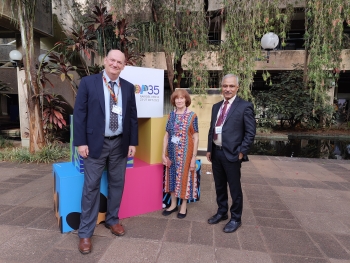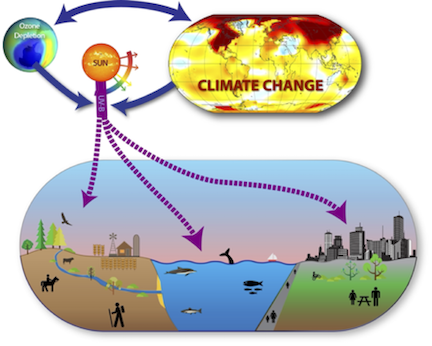
Dr. Paul W. Barnes, Professor of Biological Sciences and the J.H. Mullahy Endowed Chair in Environmental Biology at Loyola University New Orleans, recently participated in the 2021 United Nations Environment Programme (UNEP) Meeting of the Parties of the Montreal Protocol (MOP33/COP12) and the 2021 Meeting of the UNEP Environmental Effects Assessment Panel (EEAP). Dr. Barnes serves as one of three Co-Chairs of the EEAP and is also the Lead Author of the Terrestrial Ecosystems Working Group of this panel. This international scientific panel regularly assesses how stratospheric ozone depletion and climate change interact to influence solar UV radiation, human health, terrestrial and aquatic ecosystems, air quality, biogeochemical cycles and natural and synthetic materials. A summary of these findings, including the benefits of the Montreal Protocol in mitigating adverse effects of these impacts, can be found in a recent publication in the journal Global Change Biology.
Dr. Barnes’ research examines how plants and terrestrial ecosystems are influenced by these global environmental changes and several recent publications provide new insights into how rapidly plants can adjust their level of UV sunscreen protection in response to fluctuating sunlight conditions over the day and under partly cloudy conditions. This research was done in collaboration with Dr. Susanne Neugart, currently a Professor at the University of Göttingen, Germany, who worked as Postdoctoral Fellow in Dr. Barnes’ lab, and Mr. Mark Tobler, a research associate with Dr. Barnes. Two of his most recent publications are:
Neugart, S., M.A. Tobler and P.W. Barnes. 2021. The function of flavonoids in the diurnal rhythm under rapidly changing UV conditions—a model study on okra. Click here to access article in journal Plants 10, 2268. .
Neugart, S., M.A. Tobler and P.W. Barnes. 2021. Rapid adjustment in epidermal UV sunscreen: Comparison of optical measurement techniques and response to changing solar UV radiation conditions. Click here to access article in journal Physiologia Plantarum.
Below is a conceptual model of how ozone depletion and climate change interact to influence human health and the environment.

